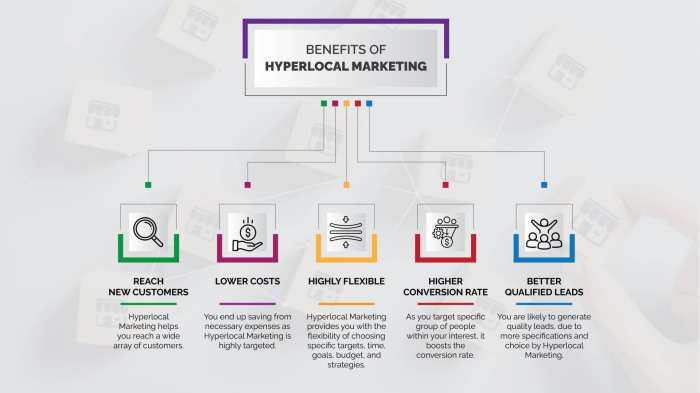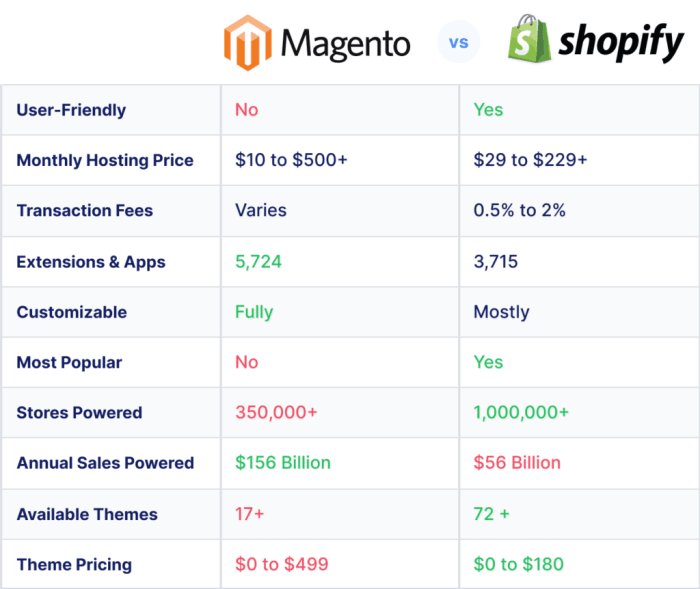The Future of Hyperlocal Digital Marketing: A Comprehensive Guide
Exploring the landscape of hyperlocal digital marketing, this guide delves into the key aspects that define this evolving field. From innovative strategies to cutting-edge technologies, discover what lies ahead in the realm of hyperlocal digital marketing.
As we navigate through the realm of hyperlocal digital marketing, we uncover the latest trends, tools, and challenges shaping the future of this dynamic industry.
Overview of Hyperlocal Digital Marketing

Hyperlocal digital marketing is a targeted marketing strategy that focuses on reaching potential customers in a specific geographic area, often using online tools and platforms. This type of marketing is significant because it allows businesses to connect with local customers in a more personalized and relevant way, increasing the chances of conversion and loyalty.
Key Components of a Hyperlocal Digital Marketing Strategy
- Local : Optimizing website content, meta descriptions, and s to rank higher in local search results.
- Geotargeted Advertising: Using location data to target ads to users in specific geographic areas.
- Localized Content: Creating content that is relevant to the local community and addresses their specific needs and interests.
- Online Reviews and Reputation Management: Encouraging and managing customer reviews on platforms like Google My Business and Yelp.
Examples of Successful Hyperlocal Digital Marketing Campaigns
- Starbucks: Starbucks utilizes geotargeting in their mobile app to promote offers and discounts based on the user's location.
- Dunkin' Donuts: Dunkin' Donuts ran a successful campaign offering a free donut to customers who checked in on social media while at their store.
- Target: Target uses local strategies to optimize their website for each store location, making it easier for customers to find store information and promotions.
Current Trends in Hyperlocal Digital Marketing
In the rapidly evolving landscape of digital marketing, hyperlocal strategies have gained significant traction due to their ability to target specific geographic areas with personalized messages. Let's delve into the recent trends shaping hyperlocal digital marketing and compare them with traditional marketing approaches.
Increased Emphasis on Personalization
Personalization has become a cornerstone of hyperlocal digital marketing, allowing brands to tailor their messaging based on location, demographics, and past interactions. By delivering relevant content to consumers in their vicinity, businesses can enhance engagement and drive conversions.
Rise of Geotargeting Technologies
Geotargeting technologies have revolutionized how businesses reach their target audience. By leveraging GPS data and IP addresses, marketers can deliver localized ads, offers, and promotions to consumers in real-time. This precise targeting not only improves ad relevance but also boosts ROI by reaching customers when they are most likely to convert.
Integration of Augmented Reality (AR) and Virtual Reality (VR)
The integration of AR and VR technologies in hyperlocal marketing campaigns is on the rise. Brands are leveraging these immersive technologies to offer interactive experiences to customers at a hyperlocal level. From virtual try-on experiences to location-based AR games, businesses are creating unique and memorable interactions that drive brand engagement.
Shift Towards Micro-Moments Marketing
Hyperlocal digital marketing is increasingly focusing on capturing micro-momentsthose brief instances when consumers turn to their devices for immediate information or assistance. By delivering relevant, location-specific content in these micro-moments, brands can influence purchasing decisions and drive foot traffic to physical stores.
Increasing Importance of Online Reviews and Ratings
Online reviews and ratings have a significant impact on hyperlocal marketing efforts. Consumers rely on peer recommendations and ratings to make informed decisions about local businesses. By actively managing and responding to reviews, businesses can build trust and credibility within their local communities, enhancing their overall brand reputation.
Tools and Technologies for Hyperlocal Digital Marketing
In the realm of hyperlocal digital marketing, various tools and technologies play a crucial role in helping businesses target their audiences effectively and drive engagement. Let's delve into some of the key tools and technologies utilized in hyperlocal digital marketing.
AI and Machine Learning in Hyperlocal Marketing
Artificial Intelligence (AI) and Machine Learning are revolutionizing hyperlocal marketing efforts by enabling businesses to analyze vast amounts of data to understand consumer behavior, preferences, and trends. AI-powered tools can help businesses personalize their marketing messages, optimize ad placements, and predict consumer behavior, resulting in more targeted and effective campaigns.
Data Analytics for Optimizing Hyperlocal Digital Marketing Campaigns
Data analytics plays a crucial role in optimizing hyperlocal digital marketing campaigns by providing valuable insights into consumer behavior, campaign performance, and ROI. By leveraging data analytics tools, businesses can track the effectiveness of their marketing strategies, identify areas for improvement, and make data-driven decisions to enhance their hyperlocal marketing initiatives.
Challenges and Opportunities in Hyperlocal Digital Marketing
In the realm of hyperlocal digital marketing, businesses often face unique challenges that can hinder their success. However, these challenges also present opportunities for growth and innovation in the hyperlocal marketing landscape. By addressing these obstacles head-on and implementing effective strategies, businesses can capitalize on the immense potential of hyperlocal digital marketing.
Common Challenges in Hyperlocal Digital Marketing
One of the common challenges faced by businesses in implementing hyperlocal digital marketing is the difficulty in targeting a highly localized audience effectively. This can be due to the lack of accurate data or insights about the target market, leading to ineffective campaigns and wasted resources.
- Difficulty in reaching a highly localized audience
- Lack of accurate data or insights
- Ineffective campaigns and wasted resources
Opportunities for Growth and Innovation
Despite the challenges, there are ample opportunities for growth and innovation in hyperlocal digital marketing. Businesses can leverage advanced technologies like geotargeting, beacon technology, and location-based services to deliver personalized and relevant content to their local audience. This can lead to increased engagement, brand loyalty, and ultimately, higher conversions.
- Utilizing advanced technologies for precise targeting
- Delivering personalized and relevant content
- Increasing engagement and brand loyalty
- Driving higher conversions
Strategies to Overcome Challenges
To overcome the challenges associated with hyperlocal digital marketing, businesses can adopt several strategies. Investing in data analytics tools to gather actionable insights, optimizing local to improve visibility in local search results, and collaborating with local influencers or partners can significantly enhance the effectiveness of hyperlocal marketing campaigns.
- Investing in data analytics tools for actionable insights
- Optimizing local for improved visibility
- Collaborating with local influencers or partners for increased reach
Closure
In conclusion, the future of hyperlocal digital marketing holds immense potential for businesses looking to connect with their target audience on a more personalized level. By embracing the opportunities and overcoming the challenges, companies can position themselves for success in this rapidly evolving landscape.
Query Resolution
What sets hyperlocal digital marketing apart from traditional marketing?
Hyperlocal digital marketing focuses on targeting specific geographic areas with personalized messaging, offering a more tailored approach compared to broader traditional marketing strategies.
How can businesses leverage geotargeting in hyperlocal marketing campaigns?
Geotargeting allows businesses to deliver relevant content and promotions to users based on their location, increasing engagement and driving foot traffic to physical stores.
What role does data analytics play in optimizing hyperlocal digital marketing efforts?
Data analytics helps businesses analyze consumer behavior, preferences, and trends in specific locations, enabling them to refine their marketing strategies for better targeting and ROI.




